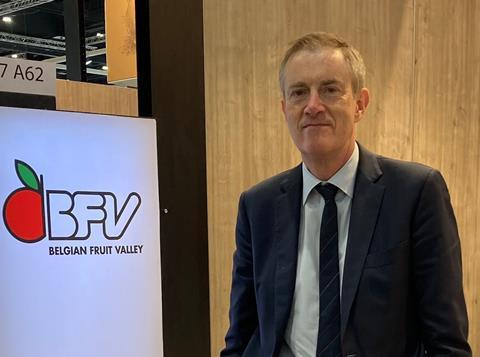Marc Evrard of topfruit exporter Belgian Fruit Valley talks to Fruitnet about some of the issues behind the farmers’ protests across Europe and the effect of the disruptions in the Red Sea on trade flows to East Asia
Following the farmers’ protests across Europe, the EU Commission has offered various concessions, on diesel subsidies, on pesticide reduction targets. Can you tell us what this could mean going forward?
Marc Evrard: There are lots of issues being thrown together. It’s about CO2, it’s about packing materials, it’s about the Green Deal, it’s about using less plant protection products, and it’s about growers feeling like they’re left with little to make sure their product is delivered to the consumer.

The issues that a pear grower might have will be different different from a wheat producer or a pig farmer. But the common ground seems to be that this approach is not working. When you look at our specific industry, talking about apples and pears, we have been in discussions about the Green Deal for the last few years, and every time our arguments have been swept off the table.
Take packaging, for example. Plastic was deemed bad, so instead of a recyclable clamshell of cherries, people can choose a paper bag. What people don’t realise is that it’s actually a multi-material bag which cannot be recycled. And on top of that, the production process is more expensive and more harmful to the environment. I’m not saying we have to go for plastics all the time, but we should understand what we are talking about.
And this goes for a lot of the different issues that have been put on the table. Which leaves growers with a very uncomfortable feeling. Nobody’s saying they are against a more environmentally friendly world. But it doesn’t happen just like that.
Policymakers haven’t given enough consideration to what people inside the industry were saying, and now what’s perhaps even more harmful is you have these protests, and all of a sudden certain decisions that couldn’t be delayed or changed get postponed for ten years and all this money becomes available. So the democratic process has been discredited. This kind of precedent gives me an uncomfortable feeling.
Have you been affected by the longer transit time to East Asia due to the disruptions in the Red Sea?
ME: The additional time it takes to circumnavigate South Africa is not the main problem. Due to slow steaming and the addition of extra ports to some routes, the transit time between Antwerp and Hong Kong has increased from 18 days in 2008 to around 32 when the Suez Canal is open. So an extra ten days on top of that is not such a concern. We can ship our Truval Conference pears for a month and then they will keep in cold storage for another month or so.
But you plan for the entire season, preparing so many containers for this week, so many for that week. So it’s important, especially with the big promotional programmes running with the retailers, such as for Chinese New Year, that everything gets delivered on time.
But at the start of January, as the disruptions in the Red Sea started, vessels already en route had to turn around and get out of the Mediterranean to make the detour around the Cape. That takes more than ten days, which means the vessel that left from Antwerp a week later will arrive around the same time. So you’re at risk of having no product one week and then too much the next, and that’s slightly disruptive. In addition, all those vessels have to make the same detour on the journey back.



